A Thousand Words
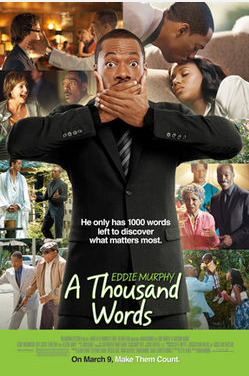
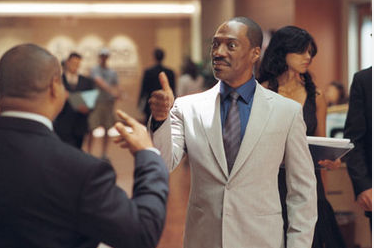 Well, here's news to lift your spirits should you find yourself about to watch this movie. A Thousand Words is a much better experience than Pluto Nash. Although, looking back on that sentence, I realize that's faint praise, as I think the stomach flu I had last year was a better experience than Pluto Nash. Maybe this will work better...A Thousand Words certainly isn't terrible. It's just mediocre and not very memorable. Still not encouraging, I know, but I can't help it. That's just the kind of movie this is. Murphy plays Jack McCall, a motormouth literary agent who, as the film opens, is desperate to make a book deal with a popular new age guru named Dr. Sinja (Cliff Curtis). While making the deal at Dr. Sinja's new age retreat, Jack happens to prick his hand on the bark of a Bodhi tree. Somehow, this causes an identical Bodhi tree to suddenly sprout up in Jack's own backyard. He is also now somehow connected to the tree.
Well, here's news to lift your spirits should you find yourself about to watch this movie. A Thousand Words is a much better experience than Pluto Nash. Although, looking back on that sentence, I realize that's faint praise, as I think the stomach flu I had last year was a better experience than Pluto Nash. Maybe this will work better...A Thousand Words certainly isn't terrible. It's just mediocre and not very memorable. Still not encouraging, I know, but I can't help it. That's just the kind of movie this is. Murphy plays Jack McCall, a motormouth literary agent who, as the film opens, is desperate to make a book deal with a popular new age guru named Dr. Sinja (Cliff Curtis). While making the deal at Dr. Sinja's new age retreat, Jack happens to prick his hand on the bark of a Bodhi tree. Somehow, this causes an identical Bodhi tree to suddenly sprout up in Jack's own backyard. He is also now somehow connected to the tree.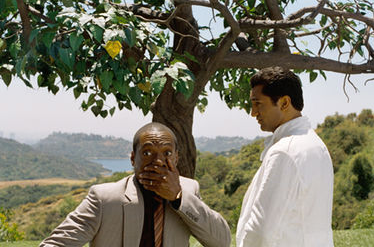 The movie doesn't really bother to explain much of how or why this happens. It's whimsical, so we're just supposed to accept it. About the whole part of Jack being connected to the tree - Apparently, whenever Jack talks, a leaf falls off the tree. Examining the tree, Dr. Sinja estimates that there are only about a thousand leaves left. Once the last leaf has fallen, the tree will die, and so will Jack. What is this supposed to prove? It's supposed to make Jack a better person, I guess. To listen more to others, especially his loving, but long-suffering wife, Caroline (Kerry Washington). But mostly, it's an excuse to have Eddie Murphy mug his face and pantomime through a lot of awkward situations, like business meetings. That's what the whole concept is based around. Since Jack can't talk without making the leaves fall, he has to find other ways to communicate. I hear you saying, why doesn't he just write down what he wants to say? He tries this at one point, and the leaves fall, just as if he were talking.
The movie doesn't really bother to explain much of how or why this happens. It's whimsical, so we're just supposed to accept it. About the whole part of Jack being connected to the tree - Apparently, whenever Jack talks, a leaf falls off the tree. Examining the tree, Dr. Sinja estimates that there are only about a thousand leaves left. Once the last leaf has fallen, the tree will die, and so will Jack. What is this supposed to prove? It's supposed to make Jack a better person, I guess. To listen more to others, especially his loving, but long-suffering wife, Caroline (Kerry Washington). But mostly, it's an excuse to have Eddie Murphy mug his face and pantomime through a lot of awkward situations, like business meetings. That's what the whole concept is based around. Since Jack can't talk without making the leaves fall, he has to find other ways to communicate. I hear you saying, why doesn't he just write down what he wants to say? He tries this at one point, and the leaves fall, just as if he were talking. There's a lot that doesn't make sense in A Thousand Words, and I don't know whether to blame the screenplay by Steve Koren (Click), or the editing, as the movie does seem to have certain scenes missing. For example, late in the film, Jack's frustrated wife tries to satisfy him sexually, but since he refuses to talk, she takes it the wrong way, and thinks he is no longer interested in her. She suggests that maybe they should seek help in their relationship. A couple scenes later, without any explanation, she has suddenly moved out and taken their toddler son with him. There is also a montage, where Jack goes around trying to do good deeds, thinking this will somehow break the curse of the tree. This is all well and good, except we don't know why Jack suddenly thinks this would help. He just does it.
There's a lot that doesn't make sense in A Thousand Words, and I don't know whether to blame the screenplay by Steve Koren (Click), or the editing, as the movie does seem to have certain scenes missing. For example, late in the film, Jack's frustrated wife tries to satisfy him sexually, but since he refuses to talk, she takes it the wrong way, and thinks he is no longer interested in her. She suggests that maybe they should seek help in their relationship. A couple scenes later, without any explanation, she has suddenly moved out and taken their toddler son with him. There is also a montage, where Jack goes around trying to do good deeds, thinking this will somehow break the curse of the tree. This is all well and good, except we don't know why Jack suddenly thinks this would help. He just does it.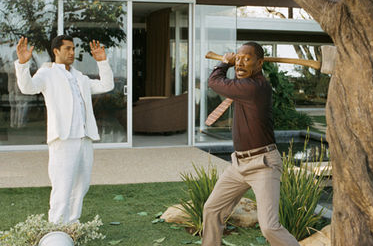 Stranger still are the later scenes, where Murphy's character suddenly starts having out of body experiences, and literally talking to his inner child in a sun-drenched field, while the sappy music score by John Debney crams emotion down our throats. We learn that the whole thing has to do with some kind of traumatic moment in Jack's childhood, and he attempts to connect with his aging mother (Ruby Dee), who is suffering from Alzheimer's. The legendary Ruby Dee brings her scenes more emotion and pathos than the material deserves, but it's still awfully manipulative. The heavy-handed final scenes, which feature Jack taking a spiritual journey into the pain of his past, is supposed to be dramatic and uplifting, but come across as confusing, as the whole tonal shift from screwball comedy to forced sentiment seems to come out of nowhere.
Stranger still are the later scenes, where Murphy's character suddenly starts having out of body experiences, and literally talking to his inner child in a sun-drenched field, while the sappy music score by John Debney crams emotion down our throats. We learn that the whole thing has to do with some kind of traumatic moment in Jack's childhood, and he attempts to connect with his aging mother (Ruby Dee), who is suffering from Alzheimer's. The legendary Ruby Dee brings her scenes more emotion and pathos than the material deserves, but it's still awfully manipulative. The heavy-handed final scenes, which feature Jack taking a spiritual journey into the pain of his past, is supposed to be dramatic and uplifting, but come across as confusing, as the whole tonal shift from screwball comedy to forced sentiment seems to come out of nowhere.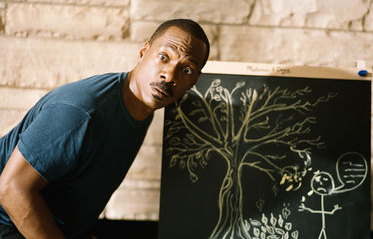
See the movie times in your area or buy the DVD at Amazon.com!






0 Comments:
Post a Comment
<< Home